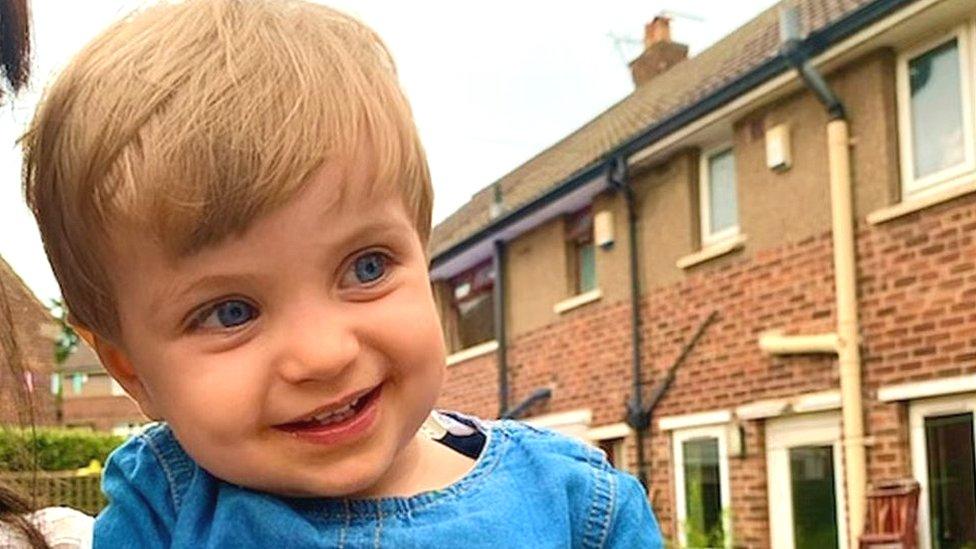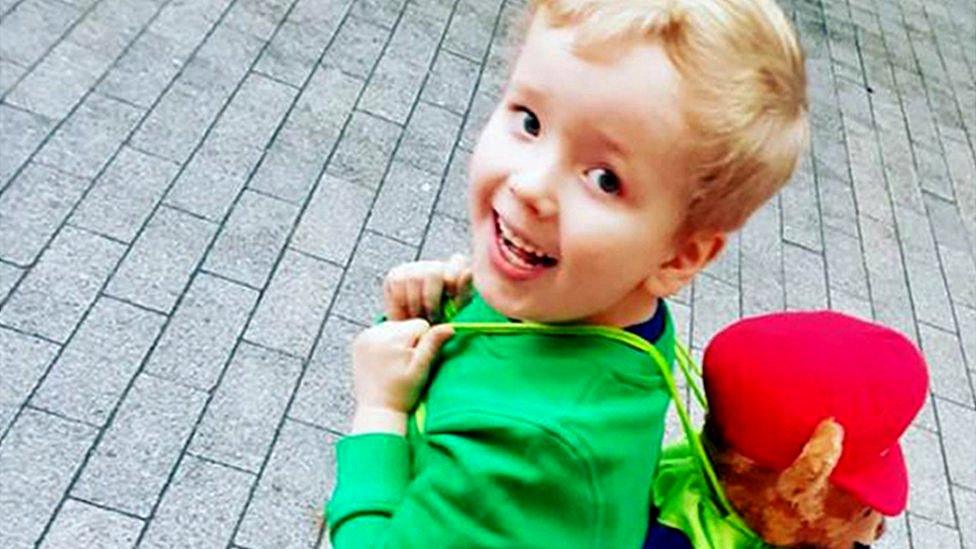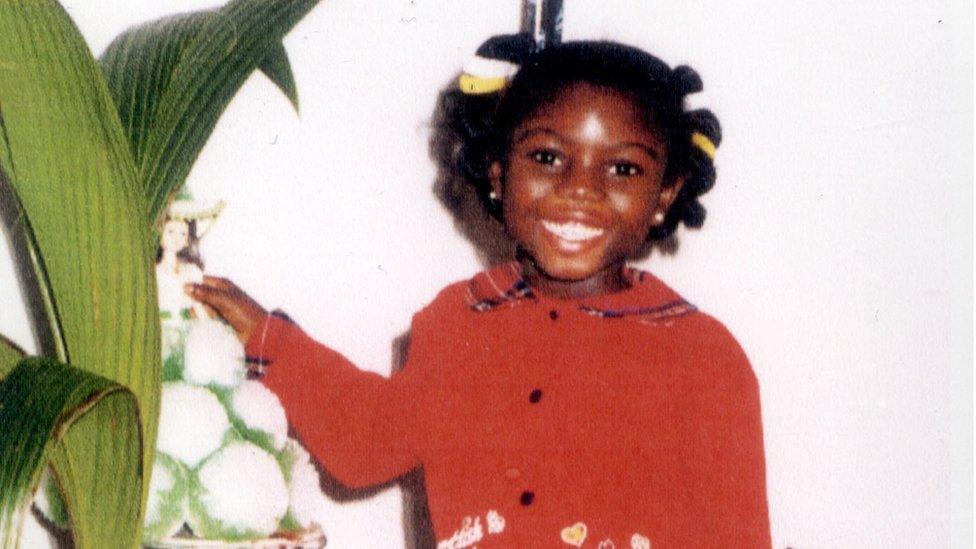Star Hobson: Why do these child deaths keep happening?
- Published

Star Hobson's family have many questions about her death
"Why didn't they listen to us?"
Nearly two years after Star Hobson was murdered by her mother's girlfriend, the toddler's aunt and step-great grandfather still have so many questions.
Sitting on their sofa, I look up at the photos of Star - with her large blue eyes - on the walls and the mantelpiece.
The grief at her loss is so near the surface and runs so deep. They are a close-knit family who have spent most of their lives living in the same few streets. They point to the house a short distance away in West Yorkshire where Star spent some of her last months.
In their search for sense, they want to know if people will learn from the mistakes made in Star's case.
Sadly this is not the first time I have sat with a family as they try to understand why a child they loved was not better protected. As a journalist working for the BBC, I have spent 30 years covering such tragedies.
This week, a review examined how social workers, police, health staff and others handled both Star's case and that of six-year-old Arthur Labinjo-Hughes, who was murdered by his stepmother in Solihull.
In both cases, the review concluded that concerns raised by their wider families had been "too often disregarded".
What I find frustrating is that the failings in the child protection system outlined are the same failings I have seen in report after report
Star's family say they tried to tell professionals they felt cut out of the toddler's life by the woman who would eventually murder her.
They believed Star's mother was being abused and manipulated, and that Star had become a shadow of herself. The report concluded their worries had been labelled as malicious and not investigated properly.
As I read the review, the jigsaw of each child's life is set out neatly in one place. Hindsight makes the warnings look obvious, but that is rarely the case. Child protection is a difficult, complex job and most of the time professionals do keep children safe.
Also, responsibility for what happened to Star and Arthur has to lie with the people who murdered them and the parents who didn't stop the abuse.

Social workers and police saw Arthur Labinjo-Hughes before his death and decided there were no safeguarding concerns
But as I turn the report's pages, what I find frustrating is that the failings in the child protection system outlined are the same failings I have seen in report after report.
Over the decades, poor information-sharing between agencies, manipulative parents, professionals who didn't challenge enough, and too little weight given to the concerns of wider family have all been common themes. Each time, change is promised and we are told "lessons will be learned".
I remember the first child death I reported on in the early 1990s. The family had been "known to social services" for some time, as the jargon goes. The owner let us into the rented flat where the baby girl spent her short life.
I can see myself standing in the empty box room where her cot had been - the sun streaming in through the window on to the white woodchip wallpaper. Her dad named her after the model of car he loved. Later, in a fit of rage, he would slam her against the wall of that tiny bedroom.

Victoria Climbie's murder in 2000 led to a shake-up of the child protection system
The names stay with you; somehow that feels right. Victoria Climbie was the seven-year-old whose murder in 2000 led to a complete shake-up of the child protection system. I sat through the court case. The cruelty was horrifying.
Each night, I went home to my baby son and held him that bit tighter, finding it impossible to comprehend how anyone could harm a child like that. It's a reminder of how much time has passed since then that he is now grown up.
I later covered the public inquiry into Victoria's death. It found the authorities involved missed 12 opportunities to protect her.
Then there was the Old Bailey trial of the killers of Peter Connelly - who was also known as Baby P. A case which also led to a national outcry and major reform.
And Khyra Ishaq in Birmingham in 2008 and Daniel Pelka in Coventry in 2012. Sadly, I could go on.
On average, at least one child is killed or murdered each week in the UK, the NSPCC says, often at the hands of a parent or carer. That figure has changed little for decades.
Not all can be protected, but when these stories make headlines, it is usually because chances to keep a child safe were missed by the authorities, whether that was social workers, police, health staff or schools.
There is an important backdrop to this. In England, children's social care has been at best struggling, at worst in crisis for a long time. As far back as the Victoria Climbie case, staff shortages and high caseloads were causing problems.
During the decade of austerity, council budgets were squeezed, but the number of families and children needing help increased.
Now, as the cost of living crisis intensifies, more families are likely to come under pressure. And there's strong evidence that poverty and deprivation increase the chance of a child being taken into care or put on a child protection plan.
When I speak to social workers they often talk about juggling high caseloads, the complex needs of the families they see, and feeling burnt out. They also talk about how unsupported they feel, not necessarily by those they work with, but by wider society.
The turnover of social workers is significant and the latest government statistics show the number of vacancies is at a five-year high, external.
Yet on the front line, where difficult decisions are being made about the risk a child faces, you need experienced people who feel confident to challenge and investigate.
The review into Star and Arthur's cases proposes new specialist child protection teams, bringing together people with a range of expertise so they can investigate and oversee cases.
Also, this week the MacAlister report into children's social care called for children's services to shift their focus from crisis intervention to helping families early.
The government says it will put forward its plan for change soon.
So, when Star's family ask whether her death will make a difference for other children, I can't give them an answer.
It really should, but that will take investment in services and determination from politicians right through to the front line of child protection over time. And that has been promised many times before.
Follow Alison on Twitter, external.